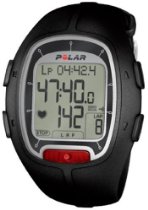

A well recognised method of testing aerobic fitness amongst fitness professionals, the Chester Step Test is becoming the standardised means of assessing fitness levels within the Fire Service.
It consists of the participant stepping up onto, and down from a box or step set to a specific height (normally 30cm) for a number of 2 minute levels. This is done in time with a metrodome which is played on a cd player. The beats of the metradome get increasingly faster at the start of every level. The initial step rate is 15 steps per minute and every 2 minutes the steps increase by 5 steps per minute.
During the test the participant wears a heart rate monitor and will also be asked at the end of every level to give an indication of their 'RPE' - record of perceived exertion. This is a numerical indication of how hard the participant feels they are working on a scale of 6-20. A copy of the scale can be seen below.
Least Effort
6
7 Very very Light
8
9 Very Light
10
11 Fairly Light
12
13 Somewhat Hard
14
15 Hard
16
17 Very Hard
18
19 Very very Hard
20
Maximum Effort
The test ends once the participant feels they have reached an RPE of 14 or once the participants heart rate raises to 80% of their maximun heart rate.
Unlike other fitness tests where you are expected to 'soldier on' until you drop, the Chester Step test focuses more on your body and hearts ability to function effeciently during exercise or pyhsical exersion and therefore it is your heart rate that is the thing that normally dictates how far you get with the test.
It is important to stress that the best way to prepare and pass the Chester Step test is to indulge in regular exercise, maintain a well balanced diet and live a generally healthy lifestyle.
If you have a test coming up, don't panic - You can practice the Chester Step test by buying the CD below.
It consists of the participant stepping up onto, and down from a box or step set to a specific height (normally 30cm) for a number of 2 minute levels. This is done in time with a metrodome which is played on a cd player. The beats of the metradome get increasingly faster at the start of every level. The initial step rate is 15 steps per minute and every 2 minutes the steps increase by 5 steps per minute.
During the test the participant wears a heart rate monitor and will also be asked at the end of every level to give an indication of their 'RPE' - record of perceived exertion. This is a numerical indication of how hard the participant feels they are working on a scale of 6-20. A copy of the scale can be seen below.
Least Effort
6
7 Very very Light
8
9 Very Light
10
11 Fairly Light
12
13 Somewhat Hard
14
15 Hard
16
17 Very Hard
18
19 Very very Hard
20
Maximum Effort
The test ends once the participant feels they have reached an RPE of 14 or once the participants heart rate raises to 80% of their maximun heart rate.
Unlike other fitness tests where you are expected to 'soldier on' until you drop, the Chester Step test focuses more on your body and hearts ability to function effeciently during exercise or pyhsical exersion and therefore it is your heart rate that is the thing that normally dictates how far you get with the test.
It is important to stress that the best way to prepare and pass the Chester Step test is to indulge in regular exercise, maintain a well balanced diet and live a generally healthy lifestyle.
If you have a test coming up, don't panic - You can practice the Chester Step test by buying the CD below.



Chester Step Test
Don't Forget - warming up and cooling down are two ways of staying one step ahead of injury. You can find some good examples of both dynamic and maintenance stretches on our 'Warm up/Cool down page.
WARNING: Please seek advice from your Doctor before undergoing any exercise recommended on this site.
WARNING: Please seek advice from your Doctor before undergoing any exercise recommended on this site.




Home
Recruitment
Forums
Fitness
Warming up
Chester Step Test
VO2 Max
TRX
Circuit Training
Interval Training
Bodyweight Training
Resistance Training
Video Clips
Products
Firefighter Tattoos
Firefighter Kids
Contact
It is so important during any kind of pyhsical activity to stay Hydrated.
Click Here >>
to view some cool
Water Bottles
Click Here >>
to view some cool
Water Bottles


